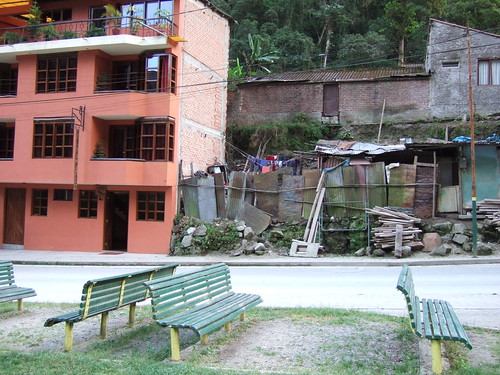Friday, July 25, 2008
Rising Expectations in Peru

from Peru
President Alan García's approval rating is estimated as low as 26%. Protests and strikes are becoming rampant especially in the countryside. Peru has seen impromptu roadblocks, burning of government offices and even one incident where police were taken hostage by protesting miners.
According to the Christian Science Monitor Peru's economy has grown for 84 consecutive weeks and is expected to grow by 9% this year in the face of a global slowdown. The percentage of persons living below the official poverty line is down by 5%.
Where is the disconnect?
The Monitor gets to the crux of the problem when it says that so far, "the windfall has fueled wealth much faster than it has reduced poverty."
A classic "Rising Expectations" Revolution is fomenting in Peru. As the Clarion understands the argument, which we first encountered in late 80's researching the Latin American development debate: relatively rapid economic growth occurs before individual inequality is addressed. Folks expectations are raised by the growth they see around them, then dashed when they don't feel as though they are partaking. Backlash is especially likely without a sizable middle-class as a buffer. If the growth is fueled by commodities and accompanied by inflation the backlash may be bigger and a full blown overthrow of the existing state system is possible. If there is widespread underemployment, even the middle class might not be enough to keep a lid on society. Some analysts see the 1979 Iranian Revolution through the lens of a "Rising Expectations" Revolution.
In the classic scenario the rich-poor gap is expanded because the rich suffer less from inflation. They are more shielded. They spend a much lower percentage of their income on staples. They may be able to offshore their wealth. They may own land or other assets, (including companies participating in the boom) that are rising in value in-line with inflation. The poor, conversely see money and investment flowing into their country, which raises their expectations of their relative possibilities, only to be jarred by the reality of inflation. The money they are making is worth less, they are somehow even poorer with growth going on all around them. The collective feeling of cognitive dissonance can be even worse if the rich present ostentatious displays of wealth, new cars, new homes, etc. Venezuela's Hugo Chavez has been stopped (thus far) from completing the trajectory of total revolution only by the bulwark of a strong established middle class of Venezuelans. Peru doesn't have that...
It does have demagogic admirers of Chavez and Bolivia's Evo Morales, amongst the most powerful are the brothers Humala and the head of the regional government Puno, Hernán Fuentes.
Labels: public protest, South America, thought
Comments:
Post a Comment